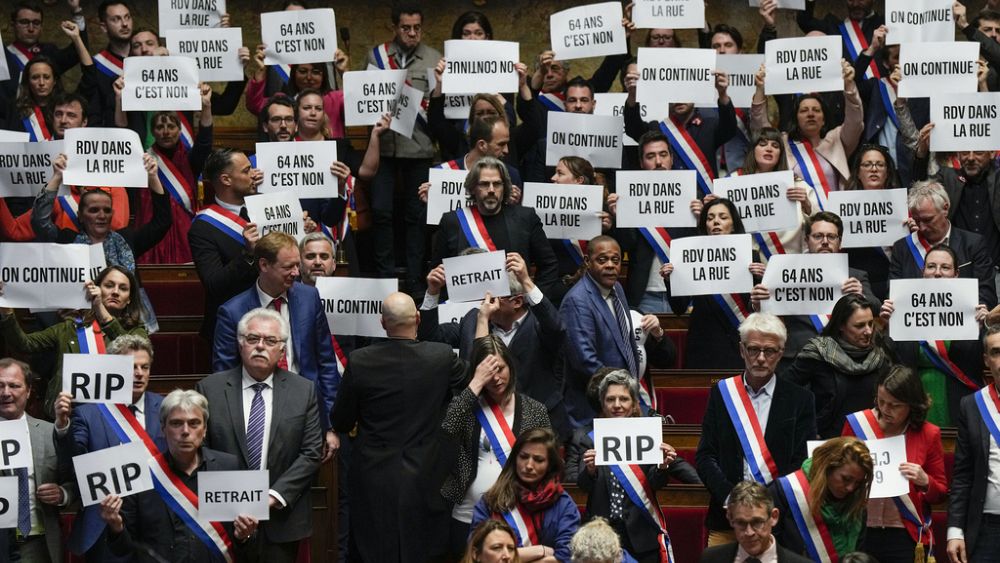
On 16 March, the French government triggered the now infamous article 49.3 to bypass parliament and push through its controversial pension reform bill. The act, which is enshrined in the constitution, triggered a no-confidence motion against Prime Minister Elisabeth Borne and her ministers – which they narrowly survived.
Months of protests against the reform and the potential use of “the 49.3” have made headline news across Europe. But could something similar happen elsewhere on the continent? We take a look at the rules in other European countries.
Germany: Government majority needed
In Germany, there is no way to push through a project like the French pension reform without a government majority in the Bundestag (parliament). Bills are introduced in one of three ways: by the federal government; from the Bundestag itself (either by a parliamentary group or at least five per cent of the members of the Bundestag); or by the Bundesrat, the legislative body representing the German regions at a federal level. This is stated in Article 76(1) of the German constitution.
If the federal government wishes to amend or introduce a law, the federal chancellor must first forward the bill to the Bundesrat. It then usually has six weeks to make a statement, on which the government can again comment in writing. The Federal Chancellor then forwards the bill to the Bundestag.
In the case of an emergency – for example, in the case of a military attack – if parliament cannot react and vote quickly enough, decisions can be made by decree. However, the protection of the German constitution remains a top priority. In extreme cases, it can provides for emergency laws making it possible, for example, to restrict freedom of movement or the secrecy of correspondence. A Joint Committee, formed of members of the Bundestag (two thirds) and Bundesrat (one third), would have the right to pass those laws. The legislation would be valid for a maximum of six months.
The caution over the use of emergency regulations in Germany can be traced back to the Weimar Republic, when National Socialists misused many emergency decrees for their own purposes.
Russia: Lower house has final say
According to the Constitution of the Russian Federation, draft laws passed by the State Duma (lower house of parliament) are subject to approval by the Federation Council (the upper house of parliament). A federal law is considered approved if more than half of the total number of senators vote for it, or if it is not considered by the Federation Council within 14 days.

If the Federation Council rejects a law, it is returned to the State Duma for revision within five days. Both houses of parliament can form a conciliation commission to work out a mutually acceptable solution on controversial issues. Based on the results, the State Duma may approve or reject the law with regard to the comments made. If the lower chamber accepts the recommendations, it approves the law by a simple majority vote and sends it back to the Federation Council. If the upper chamber then rejects the law, but the Duma disagrees, the draft law is put to a vote in its original version. If two thirds of the lower chamber vote in favour, the law is adopted and sent to the president to be signed, effectively bypassing the Federation Council.
Italy: Vote of confidence is king
In Italy, the government puts forward a vote of confidence on a law. If approval is given by parliament, the law is passed. The passing – or otherwise – of a law does not depend on what is enshrined in the constitution.
In practice, the vote is used by the government to consolidate a parliamentary majority or to avoid obstruction by the opposition. A vote of no confidence in a law is also considered a vote of no confidence in the government. In this case, the government is required to hand over its mandate to the Head of State (the president).
UK: Simple majority needed, but there may be a long wait
The UK famously does not have a ‘codified’ constitution, explicitly setting out the powers of, and giving legitimacy to, its legislature. It is impossible to bypass parliament if the government wishes to create a new statute. All laws must pass through a simple majority in the two houses of parliament: the House of Commons, which is elected; and the House of Lords, which is appointed. In the unusual case that the House of Lords rejects a bill, the House of Commons can pass it regardless, after waiting a year.

Spain: Used in “extraordinary and urgent need”
The closest equivalent to France’s article 49.3 in Spain is the royal decree law.
This is a legal norm with the status of law, which is issued by the government only “in case of extraordinary and urgent need”. The parliament has to validate the urgent situation prompting the royal decree law within 30 days, not its content. This allows the government to pass a law without the need for parliamentary debate.
According to the Spanish Constitution, in article 86, these royal decree laws “may not affect the organisation of the basic institutions of the state, the rights, duties and freedoms of citizens (…), the regime of the autonomous communities, or general electoral law”.
Matters such as the right to strike or issues relating to education could not be modified by royal decree law.
In recent Spanish political practice, the royal decree law has been used more and more as a means by which the Executive incorporates laws into the legal system, thus cutting down the time it takes to pass a law. It is often strongly contested by the opposition.



